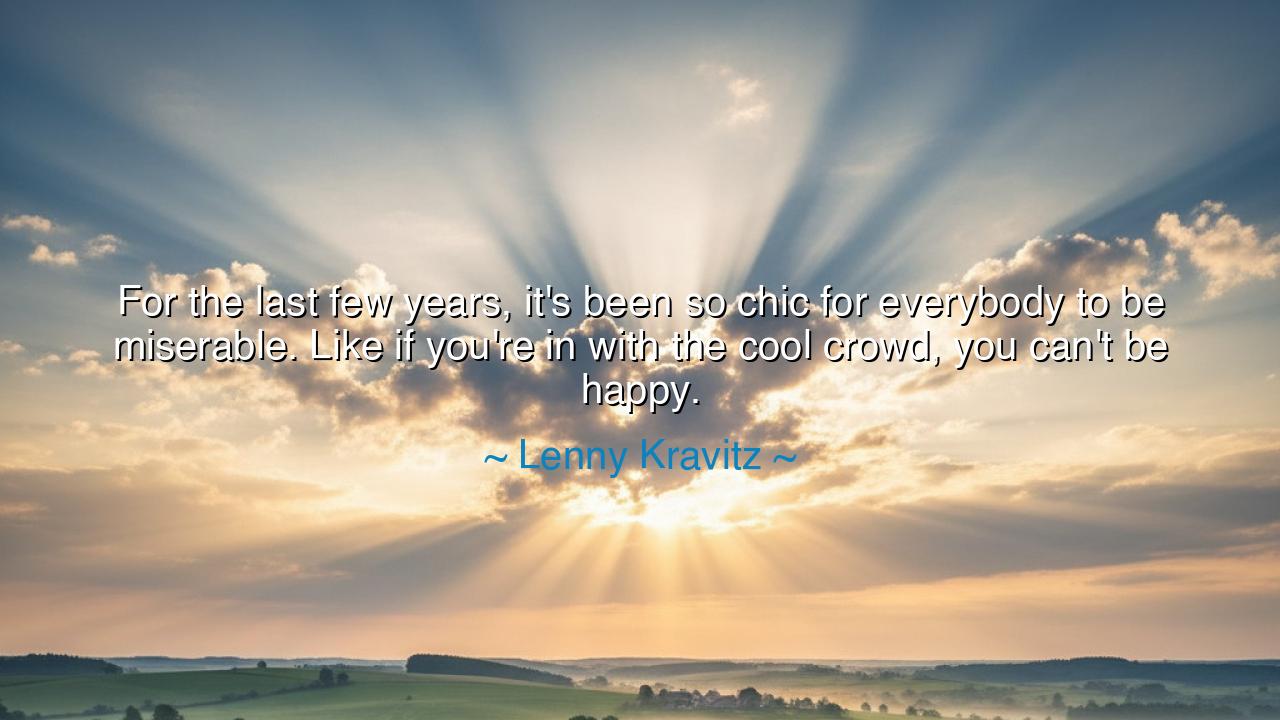
For the last few years, it's been so chic for everybody to be
For the last few years, it's been so chic for everybody to be miserable. Like if you're in with the cool crowd, you can't be happy.






Lenny Kravitz, with his characteristic blend of insight and candor, speaks to a cultural truth in his observation: "For the last few years, it's been so chic for everybody to be miserable. Like if you're in with the cool crowd, you can't be happy." This striking statement delves into a powerful, and often troubling, trend in modern society—the romanticization of misery and the idea that happiness is somehow uncool or unworthy of pursuit. Kravitz reflects a tension between authentic joy and the perceived value of suffering, a tension that has manifested in many societies throughout history.
In the ancient world, the philosophers often grappled with the same notions. Socrates believed that true happiness could only be attained through the cultivation of wisdom, virtue, and the pursuit of truth. Yet, his society, much like ours, often confused status with happiness, and many of his contemporaries believed that suffering was a sign of depth and wisdom. Similarly, the Stoics valued inner peace and virtue, but they also recognized the importance of contentment in the face of life's challenges. It was not through perpetual misery that one found enlightenment, but through the balance of hardship and joy. Yet, even then, many were quick to adopt a façade of suffering as a sign of greatness or understanding.
Consider the philosopher Diogenes, who lived in a barrel and rejected the trappings of luxury, embracing poverty as a means of attaining freedom. While he might be seen as someone who glorified suffering, his true purpose was to break free from the material world and expose the illusion that wealth and status were the keys to a meaningful life. Diogenes wasn’t advocating for misery, but for the stripping away of false pretensions and the pursuit of true self-sufficiency and contentment. Like Kravitz, Diogenes understood that authenticity should be valued over the miserable performance many people put on to appear "deep" or "enlightened."
In more recent times, the romanticization of suffering has been evident in the cultural movements of various decades. In the 1990s, for instance, the grunge movement presented pain and alienation as symbols of coolness, a trend that swept through music and fashion. The likes of Kurt Cobain, with his raw, often despairing lyrics, became icons, not because they sought happiness, but because they portrayed life’s hardships with an air of rebellion and authenticity. Yet, in this environment, happiness was often viewed as shallow, an emotion that lacked the depth of pain. The message was clear: to be truly cool, you had to wear your suffering like a badge of honor.
Kravitz's observation points to a dangerous cultural shift, where joy and fulfillment have been overshadowed by a misplaced desire to conform to a standard of miserable coolness. But history reminds us that true wisdom and greatness lie not in embracing despair, but in cultivating resilience, finding peace within ourselves, and seeking authentic happiness. Happiness is not a sign of weakness; it is the victory of the human spirit over life’s inevitable struggles. Socrates and Aristotle both saw happiness as the culmination of a virtuous life, one grounded in integrity, gratitude, and the pursuit of excellence.
The lesson here is one of self-awareness and authenticity. Happiness is not something to be ashamed of, nor is it a trait that belongs only to the naive or shallow. We must resist the pressure to conform to an image of suffering as a sign of wisdom or worth. True strength lies in embracing joy, finding peace amidst chaos, and living fully in the moment, unashamed of the happiness we cultivate. Like the wise men of old, we must recognize that misery does not bestow depth—it only stifles the spirit. Happiness, in its truest form, is an expression of a fulfilled life lived with purpose, authenticity, and courage.
In our daily lives, let us not be swayed by the false narratives that suggest suffering is the only path to meaning. Seek happiness in your own way, find peace within yourself, and do not feel compelled to adopt the coolness of misery. Instead, be brave enough to live with joy, to pursue your passions without fear of judgment, and to build a life where fulfillment is not a sign of weakness, but a testament to your strength and wisdom. Choose happiness, for it is not only a gift to yourself, but a light that others can follow.






AAdministratorAdministrator
Welcome, honored guests. Please leave a comment, we will respond soon